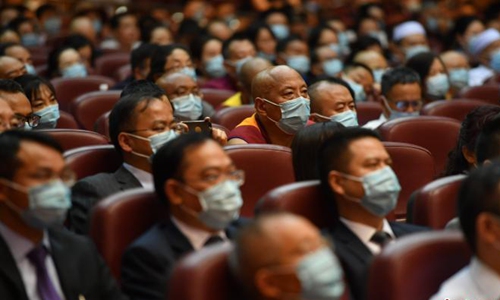
Photo: China News Service
Many provinces and cities in China have held their local two sessions with enhanced measures to prevent and control the COVID-19 epidemic, including reducing the number of attendees and providing online interviews, and observers wonder whether these measures could be used for the upcoming national two sessions scheduled next week.Southwest China's Yunnan Province started its local two sessions on Sunday, making it the last province to do so.
The Global Times found that most provinces have shortened their two sessions' period this year due to the COVID-19 epidemic. For example, Yunnan cut the period to three days, while in 2019 the two sessions lasted for more than five days. Southwest China's Sichuan Province shortened the period to four days.
The agenda of the meetings was adjusted due to the shortened periods. For example, Yunnan officials do not need to read their entire work reports at the meeting - they can only give a brief report.
In Hangzhou, capital of East China's Zhejiang Province, the number of people to speak during the meetings was reduced from 15 to five.
Strict epidemic prevention and control measures were adopted. In Sichuan, all attendees have to provide two negative results of COVID-19 nucleic acid tests and a "green code," which indicates the health of the holder.
In addition, attendees were not allowed to leave where they live or have visitors during the sessions.
Attendees to Yunnan's and Sichuan's two sessions all wore masks during the meetings, except those sitting on the rostrum, according to media reports.
Similar measures are also supposed to be applied in the national two sessions, which will fall in late May.
A member of the Chinese People's Political Consultative Conference (CPPCC) who comes from outside Beijing told the Global Times on condition of anonymity that they would depart for Beijing on May 19 and undergo nucleic acid testing before departure. The CPPCC session will start on May 22.
Hong Kong's deputies to the National People's Congress (NPC) and CPPCC members will first go to Shenzhen in Guangdong Province to undergo nucleic acid tests before flying to Beijing, another source previously told the Global Times.
The number of staffers accompanying NPC deputies and CPPCC members to Beijing, including reporters, will be reduced.
A media worker in Central China's Hubei Province told the Global Times that the company would not send anyone to Beijing this year.
Another media worker said that reporters could only interview NPC deputies and CPPCC members by phone or video this year. Previously, they could enter places where deputies and members live to do face-to-face interviews.
Previous venues like Ministers' Passage, NPC Deputies' Passage and CPPCC Members' Passage would probably continue this year but would also be conducted through videos, analysts said.
Attendees to Yunnan's and Sichuan's two sessions all wore masks during the meetings, except those sitting on the rostrum, according to media reports.
Similar measures are also supposed to be applied in the national two sessions, which will fall in late May.
A member of the Chinese People's Political Consultative Conference (CPPCC) who comes from outside Beijing told the Global Times on condition of anonymity that they would depart for Beijing on May 19 and undergo nucleic acid testing before departure. The CPPCC session will start on May 22.
Hong Kong's deputies to the National People's Congress (NPC) and CPPCC members will first go to Shenzhen in Guangdong Province to undergo nucleic acid tests before flying to Beijing, another source previously told the Global Times.
The number of staffers accompanying NPC deputies and CPPCC members to Beijing, including reporters, will be reduced.
A media worker in Central China's Hubei Province told the Global Times that the company would not send anyone to Beijing this year.
Another media worker said that reporters could only interview NPC deputies and CPPCC members by phone or video this year. Previously, they could enter places where deputies and members live to do face-to-face interviews.
Previous venues like Ministers' Passage, NPC Deputies' Passage and CPPCC Members' Passage would probably continue this year but would also be conducted through videos, analysts said.
